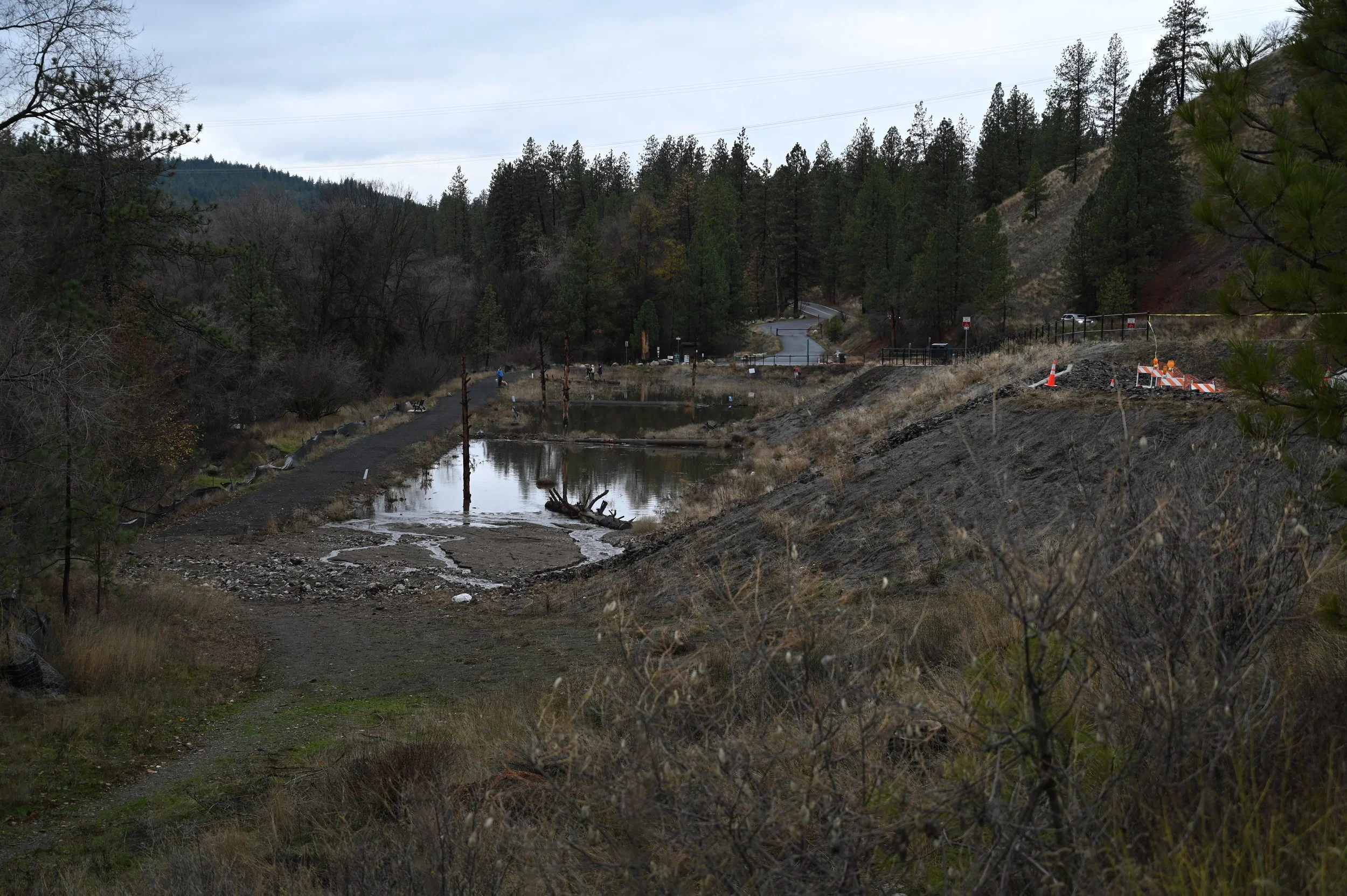Sometimes even new infrastructure doesn’t work as planned, and that’s what happened recently with a stormwater treatment facility in Spokane. Built to keep untreated runoff out of the Spokane River, the system hit a snag during a big storm, causing some overflow and pollution concerns. It’s a frustrating setback, but the City of Spokane worked quickly to mitigate pollution from the site to the river and assure us that fixes are underway.
Project Background
One of the largest challenges for the Spokane River faces come from stormwater runoff—a significant source of pollution. According to the EPA, urban stormwater is one of the leading causes of water quality problems in U.S. rivers and streams. At TJ Meenach, the city’s largest stormwater outfall discharges untreated runoff from the Cochran Basin (a 5,000 acre area of the city) directly into the river, carrying with it a harmful mix of pollutants like oil, sediment, and heavy metals. This untreated runoff degrades water quality, threatens aquatic life, and undermines the health of the broader watershed.
To address the significant impact of the TJ Meenach outfall, the City undertook a major infrastructure project to redirect stormwater to various infiltration ponds and swales. These swales use biofiltration to remove harmful pollutants from the stormwater before it goes back into the environment. This new infrastructure project diverts up to 600 million gallons of direct stormwater discharge to the river, helping to protect the river’s health. The system had just begun to undergo testing at the beginning of November, and is not yet fully operational.
The First Major Storm and a Minor Setback
Beginning on November 19th, we started to see steady rainfall across the region in much larger quantities than normal. This rainfall sent large volumes of water through the new outfall into the swales at TJ Meenach. The water flows caused the hillside just below the outfall to erode and collapse, causing a portion of the overflow catchment to be swept away and sending significant amounts of sediment and debris into the swales below.
The erosion was caused by a design flaw that left a portion of the earthen wall on the basin vulnerable. Water was able to penetrate the hillside and create a new channel through the project area, causing a portion of the earthen wall to collapse. Thankfully, most of the debris appears to have remained within the swales, and has had little impact on the river. However, until this is repaired and fully operational, untreated stormwater will likely continue to be discharged to the river.
Even with the small set back, we can already see just how this project will protect our river in future weather events. Despite the breach, the project, including the biofiltration swales, is largely functioning as intended and keeping pollution out of the river. Runoff that was previously sent directly to the river was sent into the swales and was allowed to slowly infiltrate into the ground, being treated by the bioengineered soils before reentering our environment. As a result, less pollution is reaching the Spokane River.
How the City is Tackling the Issue
Since the incident, the City has worked to stop the water from reaching the river, and began to work on a plan to fix the earthen wall. Silt fencing has been installed to keep sediment from the site out of the river. To address the problem for the long-term, the minor flaw in the overflow will be redesigned and rebuilt to withstand the rainfall and flows expected at this outfall.
Additionally, once the rain subsides, the City will continue to bring the rest of the project online by installing pumps to send water to stormwater to the disc golf course. These pumps will send a significant portion of this stormwater to the disc golf course just downstream, where there are additional biofiltration swales. Crews will also be monitoring the site to ensure that sediment from the site does not reach the river throughout the wet season. Repairs to the earthen wall will have to wait until spring, but with the implementation of these other measures the river will be better protected this wet season than ever before.
Stormwater management is critical to protecting our river from pollution and ensuring the health of our watershed. As climate change creates more frequent, extreme weather events, our exposure to stormwater runoff pollution will increase. It is important that the City infrastructure be able to accommodate these large storms.
We are confident that the City will take the steps necessary to complete this project in a manner that will be beneficial to the river for years to come. The modernized infrastructure will help us better manage stormwater from large rain events and significantly reduce pollution in the Spokane River. The stormwater infrastructure project at TJ Meenach Bridge represents a critical step forward in safeguarding the Spokane River. Spokane Riverkeeper will continue to support the City’s efforts to modernize its infrastructure and will continue advocating for solutions that benefit our community and river.



